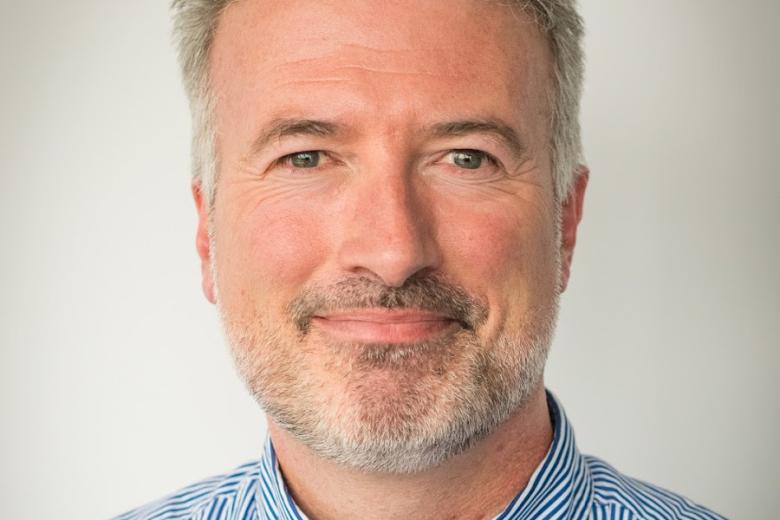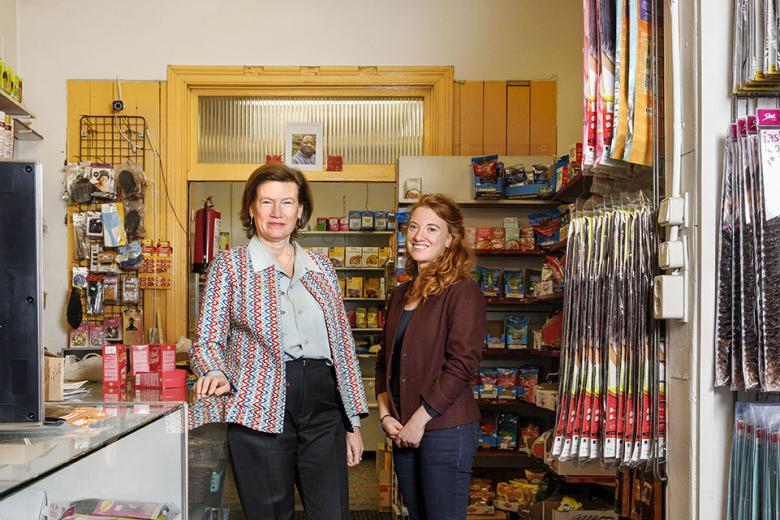Kiran Patel says farewell to FASoS
Kiran Patel laughs, only a little apologetically: “The offer was simply too good!” He is leaving Maastricht University for the Ludwig-Maximilians-Universität in Munich, where he will hold the chair in European History and establish an interdisciplinary research centre on Europe and European history. Here, he reflects on his time in Maastricht.
“I didn’t know Maastricht University (UM) well before I got here”, Patel recalls. “Colleagues told me it was a young, dynamic university and very good in European studies.” The idea became more appealing the farther he got in the recruitment process. “The impression I got – and it turned out to be true – was that interdisciplinarity is taken very seriously at the Faculty of Arts and Social Sciences.” And so, in 2011, he moved to Maastricht from the European University Institute in Florence.
The new head of the history department met his colleagues under challenging circumstances. “In my first weeks, the dean told us about the impending cutbacks that would mean extra teaching for all of us. It wasn’t an easy start, but I appreciated the constructive spirit.” Patel is clearly fond of FASoS and its dedication to small-scale Problem-Based Learning – as well as its somewhat idiosyncratic system.
Slightly anarchic
“It’s slightly anarchic”, he laughs. “You can be a hotshot department head doing TV interviews and then be parachuted in to tutor in a course coordinated by an assistant professor the next day – that’s great! It makes you think twice about picking a fight with someone. It creates a culture where people really need to work together, just because it’s all less individualistic.”
That also meant more undergraduate teaching for him – which he thoroughly enjoyed. “I was really struck by how international our classroom is. You talk about these difficult topics, from the Armenian genocide to eugenics in Sweden, and people bring so many different experiences to the table because of their backgrounds, their reading, their life experiences.” Facilitating dialogue by integrating diverse perspectives is, in his view, “very UM”.
The most important thing Patel wants to confer on his students is critical, independent thinking. He recalls, with pride, his students simulating the negotiations around the Maastricht Treaty. “They were incredibly professional: the negotiator for Italy even got a better deal than was actually the case in the treaty”, he laughs. “It was amazing to watch those group dynamics.”
Critical minds
Patel sees cooperation and interdisciplinarity as vital in an age of specialisation. This September, FASoS will launch the new bachelor’s programme in Digital Society, in which critical thinking will go hand in hand with computing. Graduates will not only be trained in understanding algorithms, but also have a firm grounding in philosophy, history, politics and culture.
“When we started thinking about the programme, we talked to stakeholders from politics and industry, and they all said this is exactly what we need: a bridge between understanding computing and reflecting on its social implications.” This, to Patel, is precisely the strength of a faculty like FASoS, where the humanities and social sciences also draw on concepts from STEM subjects (science, technology, engineering and mathematics).
Informal but too many forms
He is concerned by the increasingly polarised discourse on Dutch higher education. “It would damage the country’s standing”, he says, if the pendulum were to swing too far from internationalisation and English as a language of instruction. “Dutch universities are attractive to international scientists and students precisely because they are so open.”
The more the academic sector expands, the greater the need for transparency and public accountability. Patel understands this. In his roles as head of department and associate dean for research, however, he has been forced to impose an ever-increasing administrative workload on colleagues he considers to be already operating at their limit. Some reforms are useful, but there is a limit, he says. “The Dutch are good at inventing bureaucratic processes which don’t exist in other countries.” The problem derives partly from the political urge to justify higher education and research to taxpayers.
Patel makes the comparison with his native Germany. “There, the education minister is less powerful and the funding bodies are more autonomous. As a result they’re better insulated from kneejerk political reactions aiming to pre-empt public criticism.” He questions the utility of more bureaucracy. “We know from all sorts of studies that you can’t legislate for innovation. The more you try to plan it, the less you’ll get it.”
Cracks in the consensus
What about that other bastion of bureaucracy, the European Union? “The EU has evolved in fits and starts. Despite all the crisis talk, even very recently we’ve seen a deepening of European integration.” There may be cracks in the consensus underpinning the project – and Patel admits to having many concerns about the EU – but he holds up the euro crisis and Brexit as examples of the Union taking a relatively unified position.
There are other positives, too, such as the role played by the European Commissioner for Competition in protecting citizens from corporate interests. More than anything, the parting UM professor is heartened by the EU’s more prominent place in our collective consciousness. “For the longest time, people cared little about the EU. Today, it’s recognised as a forum for decision-making on crucial issues. So it’s not necessarily a bad thing that the EU is becoming ever more politicised.”

Also read
-
SBE researchers involved in NWO research on the role of the pension sector in the sustainability transition
SBE professors Lisa Brüggen and Rob Bauer are part of a national, NWO-funded initiative exploring how Dutch pension funds can accelerate the transition to a sustainable society. The €750,000 project aims to align pension investments with participants’ sustainability preferences and practical legal...
-
Empowering Smallholder Farmers in the Data Economy: Unlocking Opportunities and Overcoming Obstacles
Frederik Claasen, the head of policy at our partner organisation Solidaridad Network on the opportunities and obstacles facing smallholder farmers in their data ecosystems.
-
How do involuntarily returned migrants fare in Senegal?
The PhD research of Karlien Strijbosch focuses on Senegalese migrants who were forced to return home after a stay in Europe. Doing justice to such stories is no easy feat, especially when you come up against walls of silence, distrust and shame. Strijbosch and her supervisor Valentina Mazzucato discuss...
